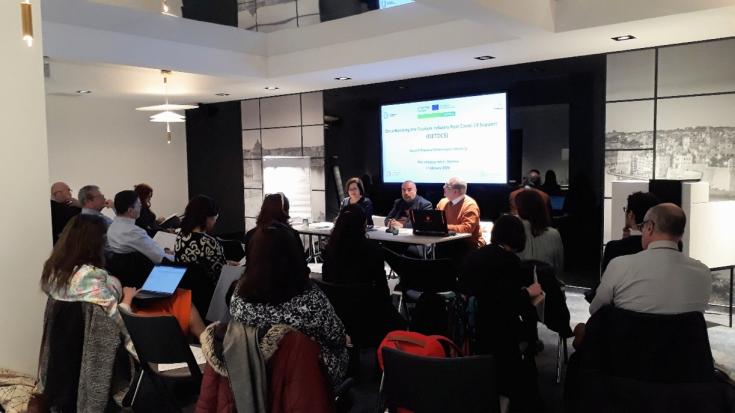Decarbonising the Tourism Sector in Malta
Key players from government entities, public authorities, business associations and academia gathered in Malta for the Second DETOCS Stakeholder Meeting of the region. Hosted by the Ministry for Tourism and Public Cleanliness and the University of Malta, the event took place on 7 February 2024 at the Embassy Hotel in Valletta in order to share the results of the regional SWOT analysis for the decarbonisation of Malta's tourism sector.
After the dissemination of SWOT analysis findings among project partners at the second interregional meeting in Seinäjoki, Finland, in November 2023, it became evident that various regions share similarities. In the case of Malta, these similarities were identified as follows:
Common opportunities
-
Need to improve the legal framework and regulatory environment.
-
Identify funding schemes such as grants and subsidised loans to push the tourism industry towards decarbonisation.
-
Increase research studies on decarbonisation.
-
Invest in eco-technologies.
-
Further development of sustainable tourism practices.
-
Use of media to market decarbonisation of tourism.
Common weaknesses
-
Energy transition requires costly financial investments.
-
Seasonal fluctuations in tourism demand may make it difficult to maintain steady energy efficiency initiatives
-
Insufficient digital know-how.
-
Lack of expertise and skills shortages in decarbonisation.
Furthermore, the stakeholders discussed the output of the Eisenhower Matrix exercise whereby the 92 identified strengths, weaknesses, threats and opportunities were prioritised in terms of importance and urgency and the top 6 priorities were further ranked in terms of feasibility for implementation. Among the top priority feasible opportunities one finds:
- Transitioning towards better waste separation, higher recycling rates and lower energy consumption to treat the generated waste in the hospitality sector.
- Conducting a Cost-Benefit Analysis (CBA) of the tourism industry could provide valuable insights into the economic feasibility and potential impacts of decarbonisation efforts and can be viewed as an opportunity to inform and refine policy and decision- making.
While the top two priority weaknesses in terms of potential feasibility for change were identified as:
- There is a noticeable gap in comprehensive data regarding Malta’s current standing in decarbonisation efforts, in terms of hotels and major contributors within the tourism sector. The absence of a defined baseline for Malta hinders the establishment of clear and measurable decarbonisation targets.
- Synchronisation of policies falling under the responsibility of different ministries and authorities is not always evident and effective. For example, increased bed capacity is supported, while no sufficient support is provided to shift to green energy to counterbalance the increase in tourists.
If fostered with adequate care and support, these opportunities identified could potentially become examples of good practice, while the weaknesses could potentially be addressed through policy changes or other appropriate actions.
Next steps resulting from the regional event in Malta are for DETOCS project partners and stakeholders to discuss the identified key priorities for each region, share experiences and elaborate on the best strategies to address them during the Interregional Stakeholders’ Meeting to be held on 15th-16th May 2024 in Malta.
